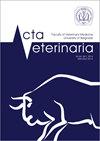Traumatic Coxofemoral Luxation in Cats Treated with Hip-Toggle Stabilization Using the Mini Tightrope® Fixation System
IF 0.8
4区 农林科学
Q3 VETERINARY SCIENCES
引用次数: 0
Abstract
Abstract The aim of this retrospective study was to evaluate the clinical and radiographic outcomes of 21 cats that underwent coxofemoral toggle stabilization using the Mini TightRope® Fixation System (mTR®). Data were compiled from client-owned cats with traumatic hip luxation. Each cat underwent the same protocol including orthopedic assessment, preoperative radiographic evaluation, surgical procedure, postoperative management and clinical re-examination at 14 days, 8 weeks and 12 months following surgery. Age, body weight, implants and osteoarthritis progression were recorded. A lameness score 0-4 was assigned to each cat. Pain upon hip extension was not quantified but as pain reaction or no pain reaction. Major complications and osteoarthritic (OA) changes were recorded. Osteoarthritic changes were classified on a 0-4 scale. Twenty-one cats were included in the study. Coxofemoral luxations were stabilized using a mTR®. At 8 weeks, weight bearing was considered normal (grade 0) in all cats and no pain reaction was elicited during hip extension. One year after surgery, orthopedic examination was within the normal limits and according to the owners, all animals exhibited a normal physical activity. No complications were recorded. Evidence of slight OA changes were observed in 5 out of 21 cats. The final outcome was considered excellent in 16/21 patients and good in 5/21 cats. The application of the mTR® system can be considered a suitable surgical treatment in cats affected by traumatic hip luxation.微型Tightrope®固定系统应用髋关节稳定治疗猫创伤性股关节脱位
摘要本回顾性研究的目的是评估21只猫的临床和放射学结果,这些猫使用Mini-TightRope®固定系统(mTR®)进行了髋关节肘节稳定。数据来自客户饲养的患有创伤性髋关节脱位的猫。每只猫在手术后14天、8周和12个月接受了相同的方案,包括骨科评估、术前放射学评估、手术程序、术后管理和临床复查。记录年龄、体重、植入物和骨关节炎的进展情况。每只猫的跛行评分为0-4。髋关节伸展时的疼痛没有量化,而是作为疼痛反应或无疼痛反应。记录了主要并发症和骨关节炎(OA)的变化。骨关节炎的变化按0-4级进行分类。21只猫被纳入研究。使用mTR®稳定股骨颈脱位。在8周时,所有猫的负重都被认为是正常的(0级),并且在髋关节伸展过程中没有引起疼痛反应。手术后一年,骨科检查在正常范围内,根据主人的说法,所有动物都表现出正常的身体活动。无并发症记录。21只猫中有5只出现轻微OA变化。16/21例患者的最终结果被认为是良好的,5/21只猫的最终结果是良好的。mTR®系统的应用可被认为是治疗创伤性髋关节脱位猫的合适手术治疗方法。
本文章由计算机程序翻译,如有差异,请以英文原文为准。
求助全文
约1分钟内获得全文
求助全文
来源期刊

Acta Veterinaria-Beograd
农林科学-兽医学
CiteScore
1.30
自引率
16.70%
发文量
33
审稿时长
18-36 weeks
期刊介绍:
The Acta Veterinaria is an open access, peer-reviewed scientific journal of the Faculty of Veterinary Medicine, University of Belgrade, Serbia, dedicated to the publication of original research articles, invited review articles, and to limited extent methodology articles and case reports. The journal considers articles on all aspects of veterinary science and medicine, including the diagnosis, prevention and treatment of medical conditions of domestic, companion, farm and wild animals, as well as the biomedical processes that underlie their health.
 求助内容:
求助内容: 应助结果提醒方式:
应助结果提醒方式:


